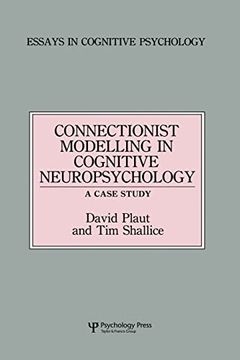Compartir
Connectionist Modelling in Cognitive Neuropsychology: A Case Study: A Special Issue of Cognitive Neuropsychology (en Inglés)
David C. Plaut (Autor)
·
Routledge
· Tapa Blanda
Connectionist Modelling in Cognitive Neuropsychology: A Case Study: A Special Issue of Cognitive Neuropsychology (en Inglés) - David C. Plaut
S/ 108,11
S/ 216,22
Ahorras: S/ 108,11
Elige la lista en la que quieres agregar tu producto o crea una nueva lista
✓ Producto agregado correctamente a la lista de deseos.
Ir a Mis Listas
Origen: Estados Unidos
(Costos de importación incluídos en el precio)
Se enviará desde nuestra bodega entre el
Viernes 12 de Julio y el
Martes 23 de Julio.
Lo recibirás en cualquier lugar de Perú entre 2 y 5 días hábiles luego del envío.
Reseña del libro "Connectionist Modelling in Cognitive Neuropsychology: A Case Study: A Special Issue of Cognitive Neuropsychology (en Inglés)"
Computational models offer tools for exploring the nature of human cognitive processes. In connectionist, neural network, or parallel distributed processing models, information processing takes the form of cooperative and competitive interactions among many simple, neuron-like processing units. These models provide new ways of thinking about the neural basis of cognitive processes, and how disorders of brain function lead to disorders of cognition. This monograph is an expanded version of a recent issue of the journal Cognitive Neuropsychology. It presents the most comprehensive existing "case study" of how the effects of damage in connectionist models can replicate the detailed and diverse patterns of cognitive impairments that can arise in humans as a result of brain damage.It begins with a review of the basic methodology of cognitive neuropsychology and of other attempts at modeling neuropsychological phenomena. It then focuses on a particular form of acquired reading disorder, "deep dyslexia," in which previously literate adults with brain damage exhibit a wide range of symptoms in pronouncing written words, the most striking of which is the production of semantic errors (e.g. reading RIVER as "ocean").A series of simulations investigate the effects of damage in connectionist models that pronounce written words via their meaning. The work systematically explores each main aspect of the design of the models, identifying the basic computational properties that are responsible for the occurrence of deep dyslexia when the models are damaged.Although the investigation concerns a specific form of reading impairment, the computational principles that emerge as critical are very general ones: representation of concepts as distributed patterns of activity, encoding of knowledge in terms of weights on connections between units, interactivity between units to form stable attractors for familiar activity patterns, and greater richness of concrete vs. abstract semantics. The fact that damage to models embodying these principles and damage to the brain can produce strikingly similar behaviour supports the view that the human cognitive system operates according to similar principles.
- 0% (0)
- 0% (0)
- 0% (0)
- 0% (0)
- 0% (0)
Todos los libros de nuestro catálogo son Originales.
El libro está escrito en Inglés.
La encuadernación de esta edición es Tapa Blanda.
✓ Producto agregado correctamente al carro, Ir a Pagar.

